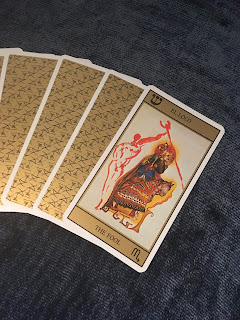Welcome!
 |
| Bibliomancy is a way of divining the future by interpreting random passages from books |
This blog will discuss how to use various divination methods as writing prompt generators. We'll be working with tarot decks, tea leaves, pendulums, dreams, random passages of books, and the raw creative power of the subconscious.
I'll be outlining how to use these various divination tools and apply them to common writing roadblocks, including character creation, protagonist choices, plot points, narrative structure, and inspiration in the following posts.
Click the sidebar to directly navigate to posts about specific writing issues or divination methods.
Method
I practice tarot as a psychological instrument—a way to draw out meanings from the subconscious. Due to the subjective nature of oracles, writers who use tarot, bibliomancy, or other divination methods can draw from a deep well of symbolic meanings and individual associations with near-unlimited outcomes. This makes divination an ideal tool for writers, as it pulls from ideas lying dormant in the mind and imbues them with new significance.
Your brain stores an alarming amount of data, from what you learn in school, to snippets of conversations you've overheard, vague snapshots of dreams, and a multitude of narratives, concepts, and archetypes absorbed through books, media, and pop culture. This means even in the throws of writer's block, you have enough ideas archived in your subconscious to write ten thousand stories, let alone just one. All you have to do is unlock this knowledge from the hidden corners of your brain.
By following the methods I explore in this blog, you'll learn how to overcome writer's block using your mind's natural desire to create meanings. It works almost like magic...
Bibliomancy involves interpreting random passages of books to tell the future.
Your brain stores an alarming amount of data, from what you learn in school, to snippets of conversations you've overheard, vague snapshots of dreams, and a multitude of narratives, concepts, and archetypes absorbed through books, media, and pop culture. This means even in the throws of writer's block, you have enough ideas archived in your subconscious to write ten thousand stories, let alone just one. All you have to do is unlock this knowledge from the hidden corners of your brain.
By following the methods I explore in this blog, you'll learn how to overcome writer's block using your mind's natural desire to create meanings. It works almost like magic...
Divination Types
 |
| Tarot cards and pendulums are popular divination tools |
Taromancy refers to using tarot cards to foretell the future. The Rider-Waite Tarot, considered the best deck for beginners, set the standard for all interpretations to follow. Traditional decks based on this model comprise of 78 cards divided into the Major and Minor Arcana, and feature variations of the same archetypal figures and the four suits: Wands, Cups, Swords, and Coins.
Pallomancy is the word for using pendulums to answer questions. You dangle the device, a small, heavy crystal attached to a chain or string, over a board or sheet of paper with an answer key, alphabet, numbers, or yes/no options. Wherever the pendulum swings is part of your answer.
Tasseomancy is more commonly known as tea reading. After drinking a cup of loose-leaf tea, you interpret the dregs at the bottom by a picture key.
Cartomancy is an umbrella term for fortune telling with cards, which means taromancy falls under this category. I use it to refer to divination by a deck of playing cards, which have their own set of meanings and archetypes that vary from the traditional Rider-Waite or Thoth tarot systems.
Oneiromancy, or divining dreams. This method can involve interpreting dreams, attaching symbolism to dream events or images, writing dreams down and analyzing them, and having (or inducing) prophetic dreams.
Psychography, or automatic writing, describes entering a dissociative state to write unconsciously, without inhibitions. Salvador Dalí practiced something similar with painting, called surrealist automatism.
Personal Beliefs
I identify as an atheist and a witch, meaning my craft is secular, and I don't believe in the divine or the supernatural. I view magic as a psychological ritual for self-knowledge and empowerment. I use tarot as a writing aid as well as for personal use to understand my emotions and latent thoughts.
Magic means different things to different people—its definition and application are entirely subjective. Though I'm not a spiritual person, I'm interested in the occult, neo-paganism, and magical subcultures from an academic perspective, and am currently researching these topics for a short story.
Disclaimer
 |
| Wicca is one of many witchcraft religions |
Many people who identify as witches do believe in the paranormal aspect of divination, and this blog does not seek to discredit such beliefs or experiences. Witchcraft is a versatile practice that varies by culture, religion, and individual belief system. This means you can practice witchcraft with or without a religion. Some consider it spiritual, while others consider it psychological. In short, witchcraft is something you do to carry out your intent, not a belief system in itself.
Magic holds great significance in Wicca, Satanism, and Modern Paganism, and also appears in some Jewish and Christian traditions as well. Some people may believe in deities, spirits, or the paranormal, but don't incorporate them into their craft. Divination can also be part of a cultural ritual, and magic plays an important part in many other ethnic and spiritual traditions.
On Cultural Appropriation
Though magical exploration is a fundamental aspect of developing one's craft, some cultures or traditions are considered "closed" to outsiders. As a white person, I consider it unethical to take magical or religious traditions from cultures our ancestors historically colonized, and will not be discussing such divination methods. I encourage you in your own journey to be mindful of what you incorporate into your craft and to respect cultural boundaries.
Read more about my opinion on magical/cultural appropriation vs. appreciation here.
Brief Author Bio
 |
| Aradia, your witchy writer guide |
I am currently earning my B.A. in English from a university in California's Central Valley. After graduation, I plan to work as a freelance writer and editor, and am interested in careers involving library communities, social justice, and literacy nonprofits. My dream job is to edit for a publishing house that centers diverse voices. Right now I'm working on finishing my novel, a queer feminist re-imagining of the Ancient Greek Persephone myth.
You can read my digital grimoire here.
Pen Name
My pseudonym comes from Charles Godfrey Leland's book, Aradia: Gospel of the Witches, an alleged account of a witch-cult in Tuscany, Italy. According to Leland, the coven worshiped the goddess Aradia, who taught them magic so they could lead the peasants in rebellion against their oppressors and overthrow the Roman Catholic Church.
As someone of Italian ancestry, I'm interested in learning more about stregheria, traditional Italian folk magic. And as a feminist socialist, I just love the image of witchy peasant women plotting to overthrow their oppressors.
Meta
Series
My Craft: Posts about my personal practice
Divination 101: Crash-courses on the history and application of various divination methods
Pop Culture Magic: A series following tarot's appearances in books, tv shows, and film
Thrifty Divination: How to use (and sometimes make) affordable alternatives to traditional divination

Comments
Post a Comment